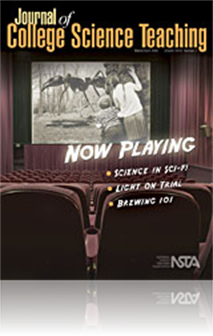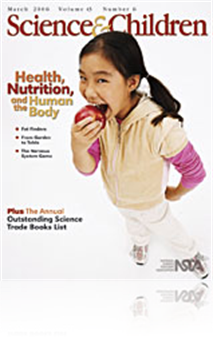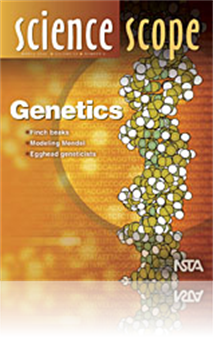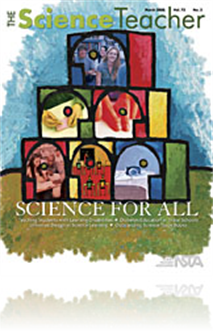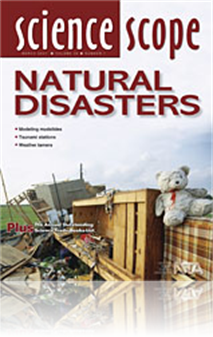All Resources
Journal Article
Editorial: Explosive Decompression
It is revitalizing to hear and to share new ideas and new methods with fellow colleagues; to engage thoroughly in the community of individuals working side by side to instruct, and yes, to assist in the maturation of students. A few good new ideas a...
Journal Article
Every Day Science Calendar: March 2006
This monthly feature contains facts and challenges for the science explorer. ...
Journal Article
The Finches' Beaks: Introducing Evolutionary Concepts
Many secondary students hold misconceptions about evolution, even after instruction, that are often inconsistent with what is accepted by evolutionary biologists. This activity is based on scientific evidence but many assumptions and alterations have...
Journal Article
Hierarchical Learning Ensembles: Team Building for Undergraduate Scientists and Engineers
This article describes the design and implementation of the Hierarchical Learning Ensemble (HLE) model, a pedagogy that assembles interdisciplinary teams of graduate, undergraduate, and secondary-level students to solve science and engineering proble...
Journal Article
In this section the editor discusses how children are expected to understand how their bodies work as well as how to keep their bodies healthy as aligned with the National Science Education Standards. She gives an overview of the articles in the cur...
Journal Article
Libros de Ciencias en Espanol (2006): A selection of recent science trade books in Spanish
If you have Spanish-speaking students in your science class, you will likely be interested in learning about the recent releases of Spanish trade books for children. From delightful board books and counting books for the very young to comprehensible...
Journal Article
One of the big changes in childhood is the loss of "baby" teeth, beginning around age five. Children often say, "I'm a big kid now. I lost my tooth!" This event is longed for, feared, and celebrated. Tooth care is much on children's (and their pa...
Journal Article
Idea Bank: Wilderness Search and Rescue
As a science teacher, you are probably bombarded with the questions, “Why do we need to know this information?” and “Who uses this information in their jobs?” from your high school students on a daily basis. To answer their questions, incorpo...
Journal Article
Exploring Cells from the Inside Out: New Tools for the Classroom
After the first observations of life under the microscope, it took two centuries of research before the "cell theory" was established. Fortunately, today's teachers can take advantage of computer technology and speed up the discovery process in their...
Journal Article
Homework can be tough-- especially if support is not available. Luckily, technology is now lending a hand to students who may be struggling at home with difficult science vocabulary, concepts, and experimental-design assignments. The following websit...
Journal Article
Science 101: How does the human body turn food into useful energy?
As with just about everything else involving the human body, it is absolutely amazing that we can chow down on various things and somehow use this basic action to grow, move, breathe, and all other kinds of things. This article answers the question ...
Journal Article
Making Mendel's Model Manageable
Genetics is often a fascinating but difficult subject for middle level students. This engaging activity presents an approach that helps students understand how genotypes can translate into phenotypes using Gummi Bears and Gummi Dolphins to solve prob...
Journal Article
Teacher’s Toolkit: The Computational Science Education Reference Desk
The June 2005 report of the President’s Information Technology Advisory Council stated that “Computational science is now indispensable to the solution of complex problems in every sector, from traditional science and engineering domains to such ...
Journal Article
Editor's Corner: Teaching Science for All
Diversity comes in many flavors. Achievement gaps have been identified with respect to race and ethnicity, but also regarding gender, limited English ability, socioeconomic status, and learning differences. The Science Teacher (TST) has a long histor...
Journal Article
Reading Harry Potter and the Sorcerer's Stone aloud to her sixth grade students, inspired a teacher to create a mathematics activity based on budgeting for school supplies. The increased interest led to a connection between their study of fungi and ...



